|
|
|
Sort Order |
|
|
|
Items / Page
|
|
|
|
|
|
|
| Srl | Item |
| 1 |
ID:
105398
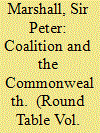

|
|
|
|
|
| Publication |
2011.
|
| Summary/Abstract |
The UK Coalition government, coming to power in May 2010, has already shown a more positive and purposeful approach to the Commonwealth than any of its predecessors. There is every reason for optimism that this will be maintained. This article gives an outline of the work and special character of the Commonwealth and looks forward to the report of the Eminent Persons' Group, the Perth Commonwealth Heads of Government Meeting and Her Majesty Queen Elizabeth's forthcoming Diamond Jubilee.
|
|
|
|
|
|
|
|
|
|
|
|
|
|
|
|
| 2 |
ID:
105397
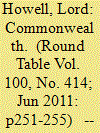

|
|
|
|
|
| Publication |
2011.
|
| Summary/Abstract |
This article, based on a lecture delivered in London, sets out why the Commonwealth is important and why it is ideally placed as a network for the future, with a unique role in the 21st century. It argues that the Commonwealth is the 'world's best soft power network'. The author sets out how the Coalition government in Britain, headed by Prime Minister David Cameron, is actively upgrading its engagement with the Commonwealth and how it is committed to putting the 'C' back into the Foreign and Commonwealth Office. The article also outlines the UK's hopes for the work of the Eminent Persons' Group, the Commonwealth Ministerial Action Group and the Perth Commonwealth Heads of Government Meeting.
|
|
|
|
|
|
|
|
|
|
|
|
|
|
|
|
| 3 |
ID:
138944
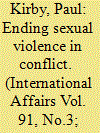

|
|
|
|
|
| Summary/Abstract |
During the past year, the UK Government has become the lead advocate for a perhaps surprising foreign policy goal: ending sexual violence in conflict. The participation of government representatives from more than 120 countries in a London Summit in June 2014 was the clearest manifestation of this project. This article offers an early assessment of the Preventing Sexual Violence Initiative (PSVI) and situates it within the history of global action against sexual and gender-based violence from UN Security Council Resolution 1325 onwards, with a particular focus on three key developments. First, the PSVI has embraced the already common understanding of rape as a ‘weapon of war’, and has stressed the importance of military training and accountability. This has exposed the tensions within global policy between a focus on all forms of sexual violence (including intimate partner violence in and out of conflict situations) on the one hand, and war zone activities on the other. Second, the Initiative has placed great emphasis on ending impunity, which implicates it in ongoing debates about the role of international and local justice as an effective response to atrocity. Third, men and boys have been foregrounded as ignored victims of sexual and gender-based violence. The PSVI has been crucial to that recognition, but faces significant challenges in operationalizing its commitment and in avoiding damage to existing programmes to end violence against women and girls. The success of the Initiative will depend on its ability to navigate these challenges in multiple arenas of global politics.
|
|
|
|
|
|
|
|
|
|
|
|
|
|
|
|
| 4 |
ID:
172394
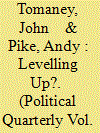

|
|
|
|
|
| Summary/Abstract |
Levelling up’ is the new UK government mantra to describe its ambitions for addressing longstanding local and regional inequalities and, especially, for tackling the problems of ‘left‐behind’ places. This article examines the thinking behind this slogan and the associated policy agenda. We identify a danger of misdiagnosis leading to policies that do little to ameliorate conditions in the places that most need help. The government’s agenda appears, so far, to be driven by electoral calculation rather than a real engagement with tackling deep inequalities.
|
|
|
|
|
|
|
|
|
|
|
|
|
|
|
|
| 5 |
ID:
168743
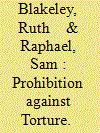

|
|
|
|
|
| Summary/Abstract |
While the UK's official position is that it neither uses nor condones torture or cruel, inhuman and degrading treatment (CIDT), it is now a matter of public and parliamentary record that UK security services and military personnel colluded in rendition, torture, and cruel, inhuman and degrading treatment, both as part of the CIA's Rendition, Detention and Interrogation (RDI) programme, at military detention facilities in Afghanistan and Iraq, and through involvement in the detention and interrogation of prisoners by allied security forces. This paper will explain why the government is falling short of its obligations under international law, and why considerable risks remain that UK intelligence and security services will continue to collude in torture and CIDT.
|
|
|
|
|
|
|
|
|
|
|
|
|
|
|
|
|
|
|
|
|